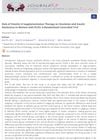 7 citations,
December 2014 in “Australasian journal of dermatology”
7 citations,
December 2014 in “Australasian journal of dermatology” Insulin resistance is not more common in idiopathic hirsutism patients than in healthy individuals.
 5 citations,
February 2015 in “Endocrinology Diabetes and Metabolism Case Reports”
5 citations,
February 2015 in “Endocrinology Diabetes and Metabolism Case Reports” Insulin therapy helped a man with autoimmune issues regrow his hair.
 8 citations,
April 2017 in “Experimental Dermatology”
8 citations,
April 2017 in “Experimental Dermatology” More plasma leptin means higher baldness risk in men.
 23 citations,
March 1994 in “Fertility and sterility”
23 citations,
March 1994 in “Fertility and sterility” Most patients improved with oral contraceptives, but some needed additional treatment.
 February 2017 in “Clinical dermatology open access journal”
February 2017 in “Clinical dermatology open access journal” Men with early hair loss may have higher insulin resistance and should be checked for related health issues.
 March 2020 in “Journal of evolution of medical and dental sciences”
March 2020 in “Journal of evolution of medical and dental sciences” Male pattern baldness, especially the vertex type, could be an early sign of cardiovascular risk factors like high cholesterol and diabetes.
 4 citations,
April 2020 in “Journal of Cosmetic Dermatology”
4 citations,
April 2020 in “Journal of Cosmetic Dermatology” High uric acid levels link to male pattern baldness, especially in young men.
 January 2017 in “IP Indian journal of clinical and experimental dermatology”
January 2017 in “IP Indian journal of clinical and experimental dermatology” Early-onset male baldness is not linked to insulin resistance, but is significantly associated with metabolic syndrome.
 January 2017 in “Open Journal of Endocrine and Metabolic Diseases”
January 2017 in “Open Journal of Endocrine and Metabolic Diseases” The document concludes that managing Dunnigan-Type Familial Partial Lipodystrophy involves treating associated health issues and using medications like metformin and leptin replacement.
 2 citations,
August 2021 in “Journal of Turkish sleep medicine”
2 citations,
August 2021 in “Journal of Turkish sleep medicine” People with polycystic ovary syndrome are more likely to have poor sleep, restless legs syndrome, anxiety, and depression.
 June 2024 in “Journal of Psychiatry Spectrum”
June 2024 in “Journal of Psychiatry Spectrum” Iron deficiency can cause psychiatric symptoms that improve with proper treatment.
 9 citations,
February 2019 in “Journal of Clinical Research in Pediatric Endocrinology”
9 citations,
February 2019 in “Journal of Clinical Research in Pediatric Endocrinology” Children with classic congenital adrenal hyperplasia have thicker heart fat and are at higher risk for heart problems and early atherosclerosis.
 April 2023 in “Research Square (Research Square)”
April 2023 in “Research Square (Research Square)” A young woman had a rare, aggressive ovarian tumor that was hard to diagnose and treat, leading to disease progression despite treatment.
13 citations,
January 2019 in “Indian Journal of Dermatology” Men with early-onset hair loss have more heart disease risk factors.
 March 2019 in “Evidence Based Women Health Journal (Online)”
March 2019 in “Evidence Based Women Health Journal (Online)” Vitamin D supplements increased ovulation rates in women with PCOS who were vitamin D deficient.
 39 citations,
September 2000 in “Obstetrics and Gynecology Clinics of North America”
39 citations,
September 2000 in “Obstetrics and Gynecology Clinics of North America” Insulin-lowering medications show promise for PCOS symptoms but can't be the main treatment yet due to limited long-term research.
 March 2018 in “Nepal journal of dermatology, venereology & leprology”
March 2018 in “Nepal journal of dermatology, venereology & leprology” Hair loss linked to prostate enlargement; stress and family history important factors.
 34 citations,
July 2014 in “Indian Dermatology Online Journal”
34 citations,
July 2014 in “Indian Dermatology Online Journal” Hair loss linked to metabolic issues and insulin resistance; early assessment may reduce future health risks.
16 citations,
January 2016 in “Indian Journal of Dermatology, Venereology and Leprology” Metabolic syndrome is more common in people with early-onset androgenic alopecia.
 1 citations,
July 1996 in “Clinical and Experimental Dermatology”
1 citations,
July 1996 in “Clinical and Experimental Dermatology” Routine thyroid tests for diffuse alopecia in women may not be necessary, but checking for iron deficiency anemia could be useful.
 5 citations,
July 2016 in “Canadian Urological Association journal”
5 citations,
July 2016 in “Canadian Urological Association journal” Hair loss in women linked to higher sexual dysfunction risk.
 49 citations,
August 1996 in “The Journal of Clinical Endocrinology and Metabolism”
49 citations,
August 1996 in “The Journal of Clinical Endocrinology and Metabolism” The combination of cyproterone acetate and testosterone enanthate is highly effective in preventing sperm production and could be a good reversible male contraceptive.
 April 2020 in “Journal of the Endocrine Society”
April 2020 in “Journal of the Endocrine Society” A woman's high testosterone and related symptoms were caused by overactive cells in her ovaries.
 47 citations,
June 2016 in “JAMA Dermatology”
47 citations,
June 2016 in “JAMA Dermatology” Men with early hair loss have similar hormone levels to women with PCOS, possibly increasing risk of obesity and heart issues.
 1 citations,
January 2017 in “Journal of Clinical and Diagnostic Research”
1 citations,
January 2017 in “Journal of Clinical and Diagnostic Research” Sodium valproate can cause reversible hair loss in some patients.
 February 2005 in “Journal of The American Academy of Dermatology”
February 2005 in “Journal of The American Academy of Dermatology” Recognizing new allergens can help reduce contact dermatitis cases.
4 citations,
January 2019 in “Archives of clinical and medical case reports” Combining FUE hair transplantation with PRP improves hair density and patient satisfaction in scarring alopecia.
 May 2023 in “Journal of Cosmetic Dermatology”
May 2023 in “Journal of Cosmetic Dermatology” Being overweight can cause or worsen skin problems in children, some more common in darker skin, and is often linked to insulin resistance.
 July 2021 in “Journal of Dermatology and Dermatologic Surgery”
July 2021 in “Journal of Dermatology and Dermatologic Surgery” There's a significant link between severe hair loss and metabolic syndrome in Saudi Arabia, suggesting early health checks could prevent future issues.
 4 citations,
August 2016 in “Australasian Journal of Dermatology”
4 citations,
August 2016 in “Australasian Journal of Dermatology” Hair loss is linked to insulin resistance in women, regardless of hormone levels.



























